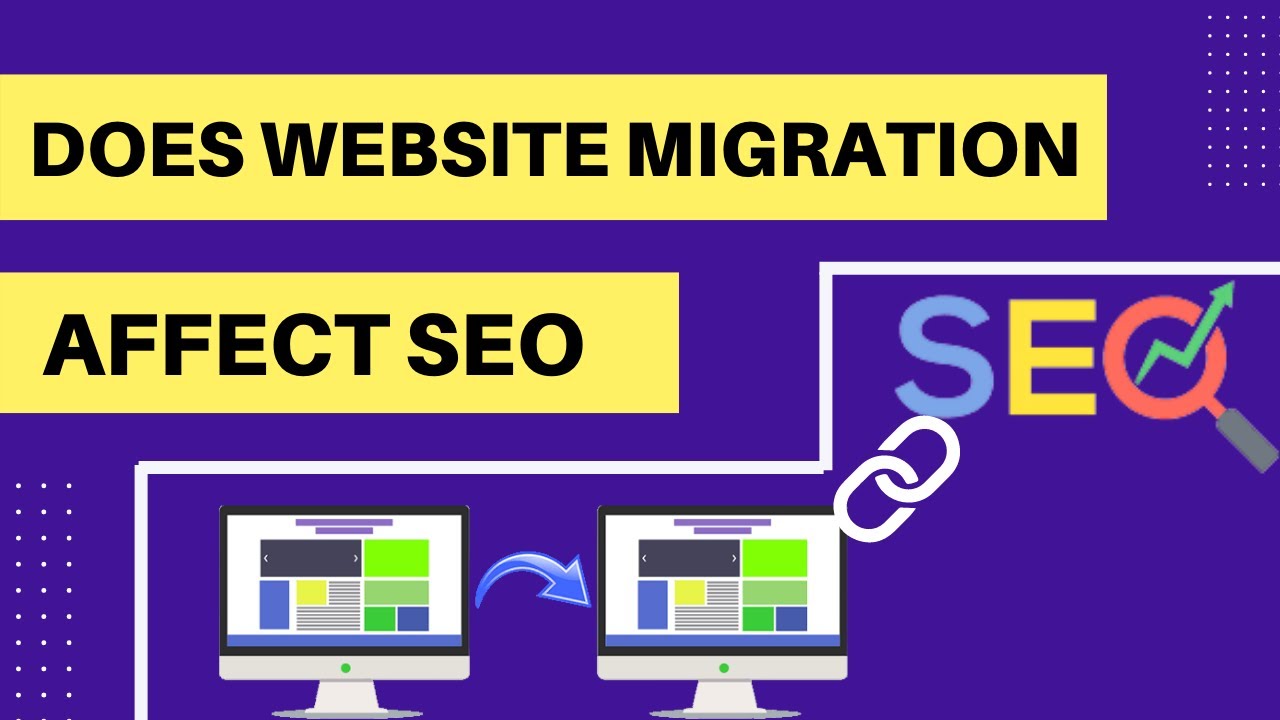SEOwebsite migrationis a critical process that involves transferring a website from one hosting environment or platform to another while preserving and even enhancing its search enginerankings. It is a complex task that requires careful planning, meticulous execution, and a thorough understanding of search engine optimization(SEO) principles.
Website owners often undertake migration to upgrade their infrastructure, improve user experience, or rebrand their online presence. However, without proper SEO considerations, a migration can lead to plummeting rankings and traffic losses. In this article, we will explore the essential steps and best practices for a successful SEO website migration.
What Is Website Migration?

What is Website Migration? | Easy Ways to Migrate Your Website | Website Migrations Tips
Website migrationis the process of moving a website from one hosting environment or platform to another. It involves transferring all website files, databases, configurations, and other relevant data from the current location to a new one. This migration can be due to various reasons, such as changing web hosting providers, upgrading to a new server, switching to a different content management system(CMS), or even changing the domain name.
The goal of website migration is to ensure a seamless transition, where the website's functionality, design, and content remain intact, while also minimizing any negative impact on search engine rankings and user experience. Website owners often undertake migration to improve their website's performance, enhance security, cater to increased traffic, or rebrand their online presence.
However, website migration is a complex task that requires careful planning and execution. Failing to consider important factors, such as search engine optimization (SEO) implications, can lead to issues like broken links, loss of organic traffic, and decreased search rankings. Therefore, website owners need to follow best practices, perform thorough audits, and implement 301 redirectsto maintain SEO visibility and avoid potential pitfalls during the migration process.
Different Types Of Site Migrations

Website Migration: The 3 Types Of Migration & When A Redirection Is Essential
There are several types of site migrations, each involving different aspects and considerations. Some of the common types of site migrations include:
- Server Migration -This type of migration involves moving a website from one web server to another. It might be necessary when changing web hosting providers, upgrading server hardware, or relocating to a different data center.
- Platform/CMS Migration -Platform migration occurs when a website switches from one content management system (CMS) to another. For example, moving from WordPressto Drupal or Joomla.
- Domain Name Change -Domain migration happens when a website changes its primary domain name. This could be due to rebranding, domain expiration, or shifting to a more suitable domain.
- HTTP to HTTPS Migration -This migration involves transitioning a website from insecure HTTP to secure HTTPS, ensuring encrypted communication between the server and the user's browser.
- Subdomain to Subdirectory Migration -Subdomain to subdirectory migration is when content moves from a subdomain (e.g., subdomain.example.com) to a subdirectory (e.g., example.com/subdirectory).
- Internationalization (i18n) or Multilingual Migration -This type of migration occurs when a website expands its reach to target international audiences by providing content in multiple languages.
- E-commerce Platform Migration -When an online store decides to switch e-commerce platforms to improve features, scalability, or user experience, it undergoes e-commerce platform migration.
- Content Migration -Content migration involves transferring website content from one website to another. For instance, during a website redesign or when consolidating multiple websites into one.
- Database Migration -Database migration is the process of moving the website's database, including data and configurations, from one server to another.
- Cloud Migration -Cloud migration involves moving a website from on-premises servers to a cloud hosting environment, such as AWS, Google Cloud, or Microsoft Azure.
Each type of migration comes with its own set of challenges and considerations. Proper planning, testing, and implementation are crucial to ensure a smooth and successful migration, regardless of the type involved. It is essential to assess the potential impact on SEO, user experience, and website functionality while undertaking any form of site migration.
Does Website Migration Affect SEO?

Does Website Migration Affect SEO? Migrate Website Without Losing SEO
Yes, website migration can significantly affect SEO if not executed properly. SEO (Search Engine Optimization) is the process of optimizing a website to rank higher in search engine results and attract organic traffic. During a website migration, various changes take place that can impact the website's SEO rankings and visibility. Here are some common SEO-related considerations and potential impacts of website migration:
- URL Changes -If the URLs of the website pages change during migration, search engines may treat the new URLs as completely different pages. This can result in a loss of search rankings and organic traffic for the affected pages. To mitigate this, implementing 301 redirects from old URLs to corresponding new URLs is crucial to maintain SEO equity and rankings.
- Broken Links and Error Pages -If website migration leads to broken links or error pages, it can negatively affect user experience and SEO. Broken links may lead to crawl errors, reducing the website's indexability and overall search engine ranking.
- Content Changes -Any significant changes to website content during migration can impact keyword targeting and relevance for search queries. It's essential to maintain the quality and relevance of the content while making changes.
- Page Load Speed -Changes in the server environment or platform may impact page load speed. Search engines consider page speed as a ranking factor, so it's important to ensure the website remains fast and optimized for quick loading times.
- Crawlability and Indexability -If the new website has poor crawlability or indexability, search engines may struggle to discover and rank its pages. This can lead to decreased organic visibility and traffic.
- XML Sitemap and Robots.txt -Make sure to update the XML sitemap and robots.txt file to reflect the changes in the website's structure and URLs. This will help search engines crawl and index the new site correctly.
- Mobile-Friendliness -If the new website is not mobile-friendly, it can negatively impact its rankings, as search engines prioritize mobile-friendly websites for mobile search results.
Pre-Migration Preparations

Site Migration Checklist | SEO Marketing Strategies
Pre-migration preparations are essential to ensure a smooth and successful website migration. Proper planning and attention to detail during this phase can significantly reduce the risk of potential issues and ensure minimal disruption to the website's functionality and SEO. Here are some crucial pre-migration preparations:
- Backup Your Website -Before initiating any migration process, create a comprehensive backup of your entire website, including all website files, databases, and configurations. This backup will serve as a safety net in case anything goes wrong during the migration, allowing you to revert to the previous version of the website.
- Identify the Scope and Objectives -Clearly define the scope of your migration project. Identify what elements of the website you want to migrate, such as pages, images, media files, databases, and user data. Set specific objectives for the migration, whether it's upgrading the hosting infrastructure, changing the CMS, or rebranding the website.
- Create a Detailed Migration Plan -Develop a step-by-step migration plan that outlines the entire process. Include a timeline, tasks, and responsibilities for team members involved in the migration. A well-defined plan helps ensure that the migration proceeds systematically and efficiently.
- Audit Your Website -Perform a comprehensive audit of your existing website. Analyze the website's structure, content, and technical aspects. Identify any existing SEO issues, broken links, or duplicate content that should be addressed during the migration process.
- Choose the Right Time for Migration -Select the appropriate time for the migration, ideally during periods of low website traffic. Avoid peak times or important eventsthat may affect user experience. Communicate the migration schedule with stakeholders to manage expectations.
- Evaluate New Hosting Environment or Platform -If you are moving to a new hosting provider or CMS, thoroughly evaluate the new environment. Ensure that it meets all the technical requirements of your website and offers the desired performance, security, and scalability.
- Test the Migration Process -Before executing the actual migration, conduct test migrations on a staging environment. Test the process thoroughly to identify any potential issues or errors. This allows you to troubleshoot and fine-tune the migration process before going live.
- Communicate with Stakeholders -Inform all relevant stakeholders, including website users, customers, partners, and team members, about the upcoming migration. Clearly communicate the reasons for the migration, its benefits, and any potential downtime or temporary disruptions.
Choose The Right Time For Migration
Choosing the right time for website migration is crucial to minimize disruptions, maintain user experience, and ensure a smooth transition. Here are some factors to consider when selecting the optimal time for migration:
- Website Traffic Trends -Analyze historical website traffic data to identify periods of low traffic. Ideally, plan the migration during times when your website experiences the least amount of traffic. This reduces the risk of inconveniencing users during the transition.
- Off-Peak Hours and Days -If your website experiences daily or weekly fluctuations in traffic, consider migrating during off-peak hours or on weekends when user activity is generally lower. This approach can mitigate the impact of any potential downtime or temporary disruptions.
- BusinessCycles -Align the migration with your company's businesscycles. Avoid critical periods such as major product launches, promotions, or peak sales seasons, as these times often involve increased website traffic and user engagement.
- Consider Time Zones -If your website serves audiences from different time zones, plan the migration to minimize inconvenience for the majority of users. Consider the time zones of your primary user base and try to schedule the migration during periods with the least impact on their browsing habits.
- Collaborate with Stakeholders:Involve relevant stakeholders, including marketing, customer support, and IT teams, in the decision-making process. Gather their insights on the most suitable time for migration to ensure alignment with overall business goals.
- Weathering Periods of Low Activity -If your website experiences seasonal fluctuations, consider migrating during a period of naturally lower activity. This allows you to use the migration as a way to optimize your website before the next high-traffic season.
- Communication with Users -Regardless of the chosen time, proactive communication is essential. Inform your users, customers, and other stakeholders well in advance about the upcoming migration. Clearly communicate the reasons for the migration, any expected downtime, and the benefits they can expect after the migration is complete.
- Test on Staging Environment -Before scheduling the migration, conduct thorough testing on a staging environment during different times to simulate real-world scenarios and identify potential issues that might arise during specific periods.
Set Up The New Environment
Setting up the new environment is a critical step in the website migration process. It involves configuring the new hosting environment or platform where your website will reside after the migration. Properly setting up the new environment ensures that the website functions correctly performs optimally, and meets all the technical requirements. Here are the key steps to set up the new environment:
- Select a New Hosting Provider or Platform -If you are changing hosting providers or switching to a new platform or CMS, choose a reputable and reliable provider that aligns with your website's needs and future growth plans.
- Install and Configure the Web Server -Set up the web server on the new hosting environment, ensuring that it supports the necessary technologies and configurations for your website to run smoothly. Common web servers include Apache, Nginx, and Microsoft IIS.
- Install and Configure the Database Server -If your website uses a database to store content and data, set up the database server in the new environment. Ensure that the database server supports the required version and is compatible with your website's database structure.
- Upload Website Files and Content - Transfer all website files, including HTML, CSS, JavaScript, images, and other media, to the new hosting environment. If your website is database-driven, import the database content into the new database.
- Check and Update Configurations -Review and update any configuration files necessary for the new environment. This includes adjusting database connection settings, paths, and any server-specific configurations.
- Install and Configure SSL Certificate (if applicable) -If your website requires HTTPS for secure communication, install and configure an SSL certificate to enable HTTPS encryption. This is crucial for protecting sensitive user data and boosting SEO rankings.
- Test Website Functionality -Conduct thorough testing on the new environment to ensure that all website functionalities work as expected. Check page load times, forms, navigation, and interactive elements to identify and address any issues.
- Optimize Server Settings -Optimize server settings for performance and security. Configure caching mechanisms, enable Gzip compression and implement security measures like firewalls and intrusion detection systems.
- Set Up Email Services (if needed) -If your website uses email services associated with your domain, set up email accounts and configure the necessary email settings in the new environment.
- Configure Domain Settings -Update the domain settings to point to the new hosting environment. This involves modifying the DNS (Domain Name System) records to reflect the IP address of the new server.
- Update CDN and Third-Party Services (if applicable) -If your website uses a Content Delivery Network (CDN) or relies on third-party services, update their settings to point to the new environment.
- Backup New Environment -After setting up the new environment, create a backup of all configurations and files to ensure a recovery option in case of any issues during or after migration.
Transfer Website Files And Data

How To Transfer Your Website To Another Hosting Provider
Transferring website files and data is a crucial step in the website migration process. This step involves moving all the necessary website components from the current hosting environment to the new one. Depending on the complexity of your website and the chosen migration method, there are different approaches to transferring files and data. Here's a general guide on how totransfer website files and data:
- Create a Full Backup -Before initiating any file transfers, create a full backup of your website, including all files, databases, and configurations. This backup serves as a safety net in case any issues arise during the transfer process.
- Transfer Files via FTP/SFTP -If you have access to the current hosting environment, use FTP (File Transfer Protocol) or SFTP (Secure File Transfer Protocol) to transfer website files from the old server to your local computer. Then, upload these files to the new hosting environment using the same FTP/SFTP method.
- Use File Manager (cPanel, Plesk, etc.) - Many hosting providers offer a file manager within their control panel, such as cPanel or Plesk. You can use this file manager to compress and download your website files from the old server and then upload them to the new server.
- Database Migration -If your website uses a database to store content and data, you'll need to transfer the database as well. Export the database from the old hosting environment using a tool like phpMyAdmin (for MySQL databases) or the command-line interface. Import the exported database into the new hosting environment using the same tool or method.
- Update Configurations -After transferring the files and database, update any configuration files to reflect the new environment's settings. This includes adjusting database connection settings and other server-specific configurations.
- Check File Permissions -Ensure that file permissions on the new server are correctly set to allow the website to function as intended. Incorrect file permissions can lead to errors and security vulnerabilities.
- Test Website Functionality - Thoroughly test the website on the new hosting environment to ensure that all files and data were transferred correctly. Check for broken links, missing images, and any other issues that might have occurred during the transfer.
- Point Domain to New Server -Update the DNS (Domain Name System) settings to point your domain to the new hosting environment. This step allows visitors to access your website from the new server.
- Monitor Post-Migration Performance -After completing the transfer, monitor your website's performance in the new hosting environment. Keep an eye out for any unexpected issues or errors that might have surfaced after the migration.
Test, Test, And Test

Data Migration Testing Tutorial | ABC of Data Migration testing | Data Migration Interview Questions
Testing is an essential aspect of website migration that cannot be emphasized enough. It is a critical phase of the migration process that ensures everything works as intended on the new hosting environment before making it live. The more thorough and comprehensive the testing, the fewer chances of encountering issues post-migration. Here's why testing is crucial and how to approach it:
- Identifying Issues -Testing allows you to identify any issues that might have occurred during the migration process. These issues can include broken links, missing files, database errors, or unexpected changes in the website's layout and functionality.
- Ensuring Functionality -By testing your website on the new hosting environment, you can ensure that all features and functionalities work as expected. This includes testing forms, interactive elements, e-commerce functionalities, and any other critical components of your website.
- Checking Responsiveness - Test your website's responsiveness across different devices and screen sizes. Ensure that it looks and functions correctly on desktops, laptops, tablets, and smartphones.
- Verifying Content -Review all the content on your website to make sure it has been transferred correctly and accurately. Check for any formatting issues, missing images, or broken media files.
- Testing Forms and Transactions -If your website includes forms or e-commerce transactions, thoroughly test them to ensure they are functioning correctly. This includes testing form submissions, payment processing, and order placements.
- Testing on Multiple Browsers -Test your website on various web browsers, such as Google Chrome, Mozilla Firefox, Microsoft Edge, and Safari. Different browsers may render websites slightly differently, so it's crucial to ensure a consistent user experience across all popular browsers.
- Testing Performance - Measure the website's performance in the new environment, including page load times and server response times. Optimize any performance bottlenecks to ensure fast and efficient website delivery.
- Testing on Staging Environment -Perform most of the testing on a staging environment that mirrors the new hosting environment. This allows you to fix any issues and fine-tune your website before making it live.
- User Acceptance Testing (UAT) -Involve your team members and key stakeholders to perform user acceptance testing. They can review the website, report any issues they encounter, and provide feedback on the overall user experience.
Update DNS And Domain Name

How to Point a Domain Name to an IP Address (DNS A record example)
Updating the DNS (Domain Name System) and domain name settings is a crucial step in the website migration process. This step ensures that visitors to your website are directed to the new hosting environment or server after the migration is complete. Here's a step-by-step guide on how to update DNS and domain name settings:
- Identify Your DNS Provider -Determine which company manages your domain's DNS settings. This could be your domain registrar, your hosting provider, or a third-party DNS service.
- Access DNS Management Console -Log in to the DNS management console provided by your DNS provider. This may be accessible through your domain registrar's control panel or your hosting provider's account dashboard.
- Locate A Records and CNAME Records -In the DNS management console, locate the A records and CNAME records associated with your domain. These records determine where your domain points, and they need to be updated with the new hosting environment's IP address or domain.
- Obtain New Hosting IP Address or Name Servers -If you are moving to a new hosting provider, obtain the new hosting environment's IP address or the name servers provided by the new hosting company.
- Update A Records -If your website's DNS uses A records, edit the existing A records to point to the IP address of the new hosting environment. Replace the old IP address with the new one.
- Update CNAME Records -If your website uses CNAME records, update the existing CNAME records to point to the domain name of the new hosting environment.
- Check TTL (Time to Live) Settings - Consider adjusting the TTL settings for your DNS records. TTL determines how long DNS servers cache your domain's information. Lowering the TTL can help propagate changes more quickly during migration.
- Test DNS Propagation -After updating the DNS settings, allow time for DNS propagation. This process may take up to 24-48 hours, although changes are often visible sooner. Use online DNS propagation checkers to verify that your domain is pointing to the new hosting environment.
- Update Domain Registrar Settings (if needed) -If you are transferring your domain to a new registrar, follow the steps provided by the new registrar to complete the domain transfer process.
- Update Email DNS Settings (if applicable) -If your domain's DNS settings include email configurations, ensure that the new email settings are correctly updated to prevent any disruption in email services.
- Verify SSL Certificate (if applicable) - If your website uses HTTPS, ensure that the SSL certificate is correctly configured and functioning on the new hosting environment.
Monitor Post-Migration Performance
Monitoring post-migration performance is a crucial step to ensure that your website is functioning optimally after the migration. It allows you to identify any issues that may have arisen during or after the migration and take prompt corrective action. Here's a comprehensive guide on how to monitor post-migration performance effectively:
- Perform Comprehensive Testing -Conduct thorough testing of your website on the new hosting environment immediately after the migration. Check all website functionalities, forms, interactive elements, and user experience to identify any potential issues.
- Monitor Website Uptime -Keep a close eye on your website's uptime after migration. Use website monitoring tools or services to track the availability of your website. Any significant downtime or outages should be addressed promptly with your hosting provider.
- Track Website Performance -Monitor your website's performance metrics, including page load times, server response times, and overall website speed. Use tools like Google PageSpeed Insights or GTmetrix to assess and optimize website performance.
- Check for Broken Links and Errors - Regularly review your website for broken links, error pages, and other issues that might have emerged after the migration. Address these issues promptly to improve user experience and maintain SEO rankings.
- Monitor Traffic and User Behavior -Analyze website traffic and user behavior using tools like Google Analytics. Check for any significant changes in traffic patterns or user engagement after the migration.
- Verify Search Engine Indexing -Check that search engines have indexed your website's new pages correctly. Use the site:yourdomain.com search query in search engines to see if your website's pages are being indexed.
- Review SEO Rankings -Monitor your website's search engine rankings for important keywords. If there are significant fluctuations, investigate potential SEO issues and take necessary corrective actions.
- Monitor Website Security -Regularly scan your website for security vulnerabilities and potential threats. Install security plugins or utilize security services to enhance website protection.
- Monitor Server Resource Usage -Keep an eye on server resource usage, such as CPU, memory, and bandwidth. Ensure that the new hosting environment can handle the website's traffic and demands.
- Gather User Feedback -Encourage users to provide feedback on their experience with the new website. Gather feedback through surveys, forms, or social mediachannels to identify any user-related issues.
- Maintain Regular Backups -Continue to back up your website regularly, even after the migration is complete. Having up-to-date backups ensures that you can quickly revert to a previous version in case of any critical issues.
Update Search Engines And Directories
After completing a website migration, it's essential to update search engines and directories to ensure they reflect the changes made to your website. This step helps search engines understand the new structure and location of your website, which can positively impact your search engine rankings. Here's how to update search engines and directories after a website migration:
- Submit Updated Sitemap -Generate a new sitemap for your website that reflects the new URLs and structure after the migration. Submit the updated sitemap to search engines, such as Google Search Console, Bing Webmaster Tools, and Yandex Webmaster, to help them crawl and index your site accurately.
- Use Google Search Console's Change of Address Tool -If you've changed your domain name during the migration, use Google Search Console's "Change of Address" tool to notify Google about the domain change. This tool helps Google associate the old URLs with their new counterparts and transfer any accumulated SEO value to the new domain.
- Update Google My Business (if applicable) -If your website is associated with a physical location and has a Google My Business listing, update the website URL in your Google My Business account to reflect the new website address.
- Update Bing Places for Business (if applicable) -If you have a Bing Places for Business listing, update the website URL in your Bing Places account to point to the new website address.
- Update Social Media Profiles and Directories - Update the website URL in your social media profiles and any online directories where your website is listed. This ensures that visitors are directed to the new website location.
- Check and Update Backlinks-Monitor your backlinks using tools like Google Search Console, Ahrefs, or SEMrush. Identify backlinks pointing to your old URLs and reach out to the respective website owners to update the URLs with the new ones. If that's not possible, set up 301 redirects from old URLs to their corresponding new URLs to retain link equity.
- Update Internal Links -If you have control over internal links on your website, update them to point to the new URLs. This ensures that visitors can navigate seamlessly within the new website structure.
Implement 301 Redirects

301 redirects for beginners - SEO tutorial
Implementing 301 redirects is a critical step during a website migration. 301 redirects inform search engines and browsers that a webpage has permanently moved to a new location. By using 301 redirects, you can seamlessly redirect users and search engine crawlers from the old URLs to the corresponding new URLs, preserving the SEO value and user experience. Here's how to implement 301 redirects:
- Identify Old and New URLs -Create a comprehensive list of the old URLs from your previous website and their corresponding new URLs on the new website.
- Access the .htaccess File (for Apache Server) or Web.config File (for IIS Server) -If you have access to your web server, locate and edit the .htaccess file (for Apache) or web.config file (for IIS) using a text editor.
- Set Up Redirect Rules - Add 301 redirect rules to the .htaccess file or web.config file.
- Test the Redirects -After implementing the redirects, test them to ensure they are working correctly. Visit the old URLs in your browser and verify that they automatically redirect to the new URLs. Check that the redirects maintain the proper page hierarchyand structure.
- Update Internal Links -If you have control over internal links on your website, update them to point to the new URLs directly. Although redirects help users and search engines, direct links improve website efficiency.
- Update External Links(Backlinks) -Reach out to other website owners linking to your old URLs and ask them to update their links to the new URLs. If that's not possible, the 301 redirects will handle the redirection from the backlinked URLs to the corresponding new URLs.
- Check for Redirect Chains or Loops -Ensure that there are no redirect chains or loops, where one redirect leads to another redirect. Redirect chains can slow down the user experience and dilute SEO value.
- Monitor Redirect Errors -Regularly monitor your website's error logs to identify any redirect errors. Address any issues promptly to ensure a smooth user experience.
- Update Sitemap and Robots.txt -Update your website's XML sitemap and robots.txt file to include the new URLs. This helps search engines discover and crawl new pages efficiently.
Communicate The Migration
Communication is key when it comes to website migration. Properly communicating the migration to your stakeholders, users, and team members ensures a smooth transition and reduces the likelihood of confusion or frustration. Here's a guide on how to effectively communicate the migration:
- Announcement Notice on Your Website - Post a prominent announcement on your website's homepage or other high-traffic pages, informing visitors about the upcoming migration. Clearly state the date and time of the migration and any expected downtime.
- Email Notifications -Send out email notifications to your mailing list and registered users. Inform them about the migration, explain the reasons behind it, and reassure them that you are taking measures to minimize disruption.
- Social Media Posts -Utilize your social media channels to share information about the migration. Post regular updates leading up to the migration day and provide contact details for support if users have any questions.
- Blog Posts and Newsletters -Publish blog posts and newsletters discussing the migration in detail. Address any potential concerns your audience may have and explain the benefits that the migration will bring.
- FAQs and Help Center -Create a comprehensive list of Frequently Asked Questions (FAQs) related to the migration and place it prominently on your website. Include answers to common questions about downtime, accessibility, and how users can reach support during the migration.
- Support Channels -Ensure that you have a dedicated support team or helpdesk available during the migration. Provide contact details and support hours, so users can reach out if they encounter any issues.
- Pre-Migration Reminder -As the migration date approaches, send out a pre-migration reminder to all stakeholders and users. Reinforce the date and time of the migration and explain any specific actions users may need to take during the transition.
- Post-Migration Thank You Message -Once the migration is complete, send a thank-you message to your audience for their understanding and patience during the process. Inform them that the migration was successful and encourage them to explore the updated website.
- Internal Communication -Ensure that all team members involved in the migration are informed about the process and are aware of their roles and responsibilities. Effective internal communication helps ensure a coordinated effort during the migration.
- Monitor Feedback -Pay attention to user feedback and comments both during and after the migration. Address any issues or concerns raised promptly and use feedback to improve the user experience.
People Also Ask
Why Is Website Migration Necessary?
Website migration is necessary for various reasons, including improving website performance, enhancing user experience, rebranding, or accommodating increased traffic and scalability.
What Are Some Common Challenges During Website Migration?
Common challenges during website migration include data loss, broken links, server and hosting issues, compatibility problems with the new platform, and technical SEOissues.
How Can I Ensure A Successful Website Migration?
To ensure a successful website migration, follow these steps: back up your website, plan the migration thoroughly, test the new environment extensively, implement 301 redirects, update search engines, and continuously monitor post-migration performance.
Conclusion
SEO website migration is an intricate endeavor that demands both technical expertise and SEO proficiency. When executed correctly, it can lead to improved website performance, enhanced user experience, and better search engine rankings. However, overlooking SEO considerations during migration can result in detrimental consequences, such as a significant drop in organic traffic and a decline in search visibility. By adhering to best practices and paying meticulous attention to SEO details, website owners can ensure a seamless migration that strengthens their online presence and maintains or even boosts their search engine rankings.

